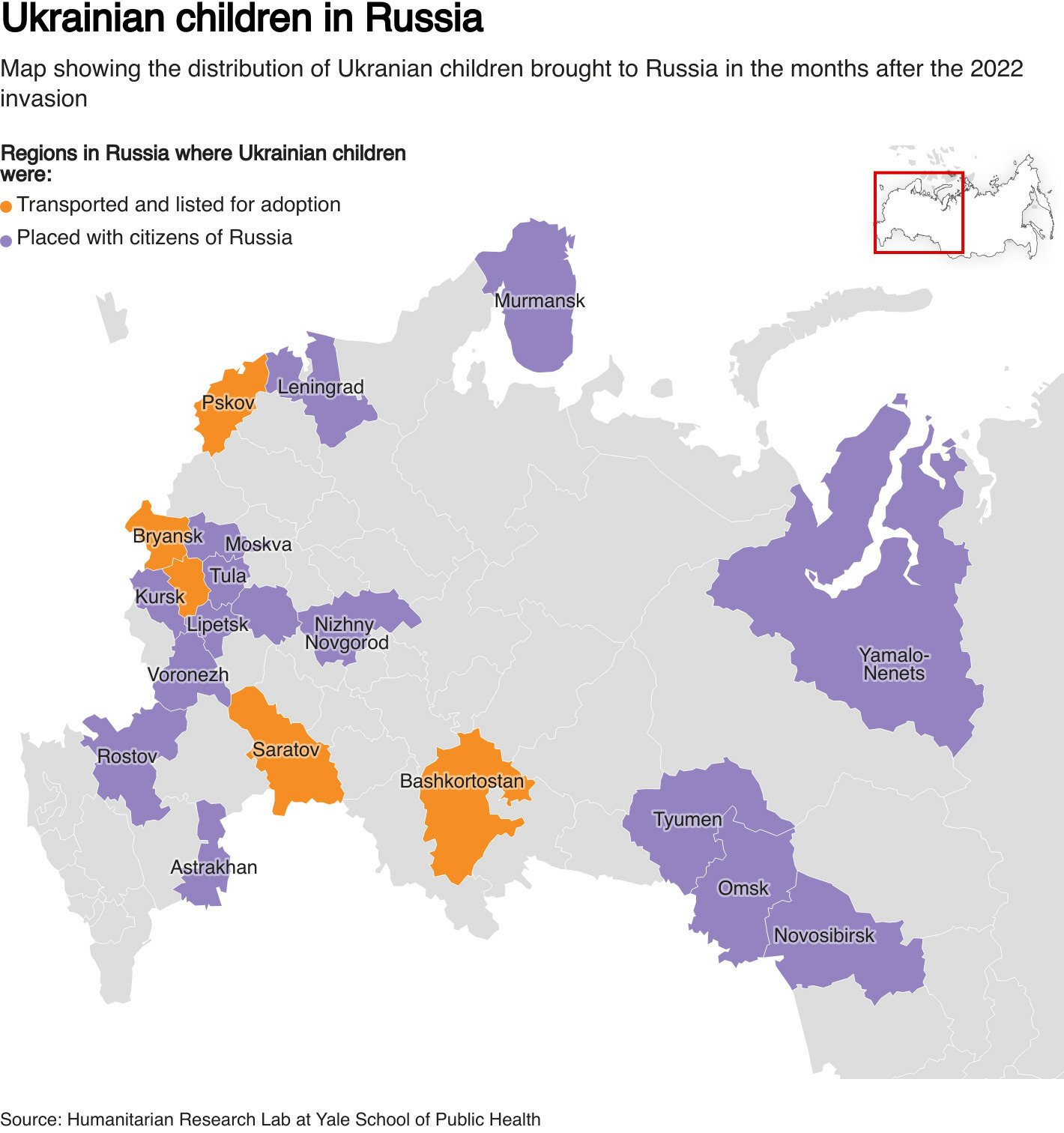Editor’s Note:
The last few weeks have been among the most stressful of the past three years.
It’s a time of deep uncertainty and crisis in Ukraine.
Despite the challenges, we have forged ahead with original and unique reporting. Will you help us continue our intrepid work by upgrading to a paid sponsorship today?
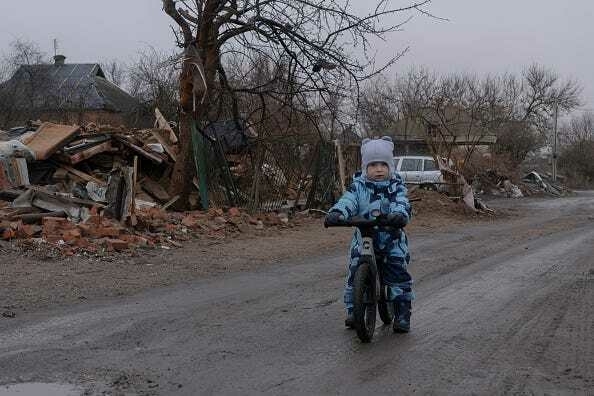
"We made a hearse entering the city for a grandmother’s funeral, and hid a child inside [with the dead body] so that she could escape," said child rights expert Anhelina Kasianova, recalling a story that touched her the most while organizing the return of children from Russian-controlled territories.
There are thousands of such stories about the children abducted by Russia during the war.
Ukrainian parents, relatives, or volunteers must risk their lives, driving under Russian crosshairs, to bring their kids back from Russia or occupied territories.
But recent American actions are threatening these efforts.
Several weeks ago, without any public warning, the Department of Government Efficiency (DOGE) cut off funding for a group of Yale University researchers. Led by Elon Musk, this group was tasked with cutting the U.S. government’s spending.
The Yale researchers are known as the Humanitarian Research Lab, and they were helping to find and return Ukrainian children deported to Russia.
Over the last three years of its operation, they have accumulated a database of 35,000 children, which contained data on children kidnapped by Russia. The program cost a reported $26 million to put together.
For now, their work is halted.
The loss of this ongoing research will significantly complicate the prosecution of the highest-ranking Russian officials and the return of the children. And it sends a message to other authoritarian regimes: you can commit the worst types of war crimes, and the United States will not hold you accountable.
However, in a ray of hope, The Counteroffensive found that at least 20,000 of these children are already known to the Ukrainian government, with the data on separate Ukrainian lists.
Since the start of the full-scale invasion, Ukraine has managed to identify about 19,546 children who were illegally taken by Russia. Now Ukraine is booting up efforts to create its own search efforts that don’t rely on American input.
This DOGE-led fiasco happened precisely as the White House pressed Russia and Ukraine to begin peace negotiations, with one of the main demands from Ukraine being the return of kidnapped children.
The abduction of children is a step that the U.N. classifies as a signal that genocide is occuring, and Moscow has continuously transported children from occupied territories, placing them up for adoption by its citizens across Russia.
It was Yale researchers who assisted Ukraine in one of the most important aspects of the anti-abduction efforts — determining the current whereabouts of the children, so that at least some of them could be returned.
“If Russians continue to erase our identity by kidnapping our children and the rest of the world is just going to turn a blind eye to this, it's just terrible,” Anhelina said.
Anhelina is still only 22. But the issue of deported children is personal for her — because she could have been among them.
Russian forces first came to her home in Donetsk in 2014, and she was forced to leave it forever. Then, fighting came to her home a second time when she was living in Irpin during the Russian military's attempt to encircle Kyiv in 2022.
So in 2023 Anhelina joined the Ukrainian Child Rights Network, working on the return of abducted children. She started small — initially focusing on gathering information about where children might have been taken from Ukrainian orphanages and placed for Russian adoption. She searched Russian websites and Telegram channels for any clues about where the children could have been sent.
Later, the primary responsibility for organizing the return of the children largely fell on her. After identifying when a child has been abducted, the most difficult part remains.
Next are efforts to find the child’s current location, then establish contact — even if just by phone — before answering the question: who will go to pick up the child from Russian-controlled territory?
The American cuts have made the already complex process of returning children even harder.
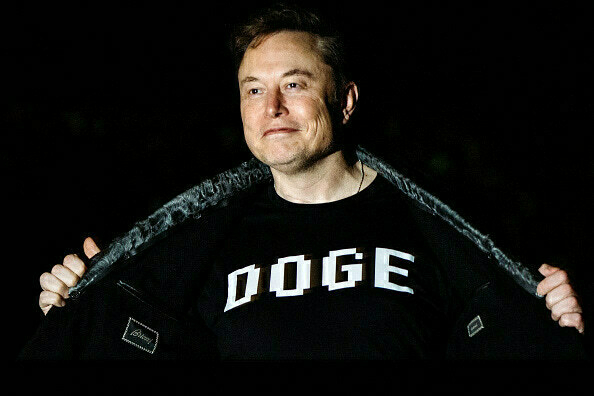
Last month, DOGE shut down one of the most powerful forces for the rescue of Ukrainian children: the Humanitarian Research Lab at Yale (HRL).
During the first year of the full-scale invasion, the Humanitarian Research Lab officially identified over 40 locations where more than 6,000 Ukrainian children were held.
“We know the number [of children and locations] is significantly higher. It's likely double that,” Raymond told The Counteroffensive.
HRL’s main method was analyzing metadata leaked online by Russian officials. This was done mostly at the mayoral level, because they found that deportations were mainly organized locally.
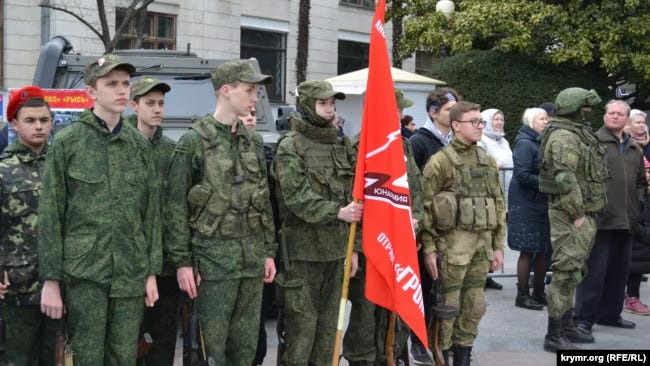
In December 2024, the HRL published a comprehensive independent study identifying hundreds of deported Ukrainian children and the routes through which Russia is conducting its deportations.
Equally important, the study showed that the deportations of children were a part of a systematic, Kremlin-driven program to make them citizens of Russia.
Yale gave children names and locations to Ukraine’s Ombudsman for Human Rights, the National Police, and the Office of the Prosecutor General. Additionally, the research team provided them with specific transport routes Russia used to move the children.
However, after the DOGE cut off its funds, the National Police denied any cooperation with Yale’s HRL team. The Office of the Ombudsman and the Office of the Prosecutor General of Ukraine did not comment.
Nathaniel Raymond, who led the Yale research team, told The Counteroffensive that without HRL's work, Ukraine will lose four crucial capabilities to access:
the whereabouts of children that have been taken for re-education, adoption, military training, or similar purposes.
the names and files of children who have been moved and made Russian citizens.
the exact number of children Yale believes have been sent to Russia for re-education.
the forensic analysis of documents that explain how Russia makes these children citizens.
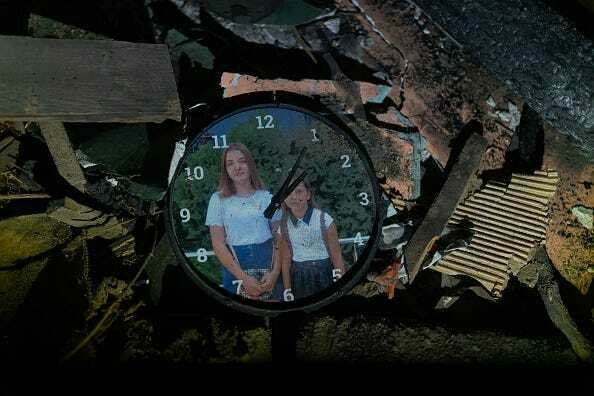
Following the DOGE cuts the Yale team at HRL lost access to a database containing information on 35,000 children that they had accumulated over three years.
This database was meant to be handed over to Europol, the EU law enforcement agency, to assist authorities in investigating crimes.
A group of congressmen, led by Republican Greg Landsman, reached out to the State Department, claiming in a letter to the Trump administration that the U.S. might delete all data related to Ukrainian children.
“The database included names of these children, biometric and satellite information – so that it was clear that we knew to the best of our ability where these kids were taken and where they are now,” Landsman said to The Counteroffensive.
The State Department denied that they had deleted the database.
When The Counteroffensive asked whether the U.S. plans to eventually transfer all the data collected by Yale University to Europol and the American authorities, the State Department spokesperson did not respond, only stating:
“The State Department does not hold the data for the Conflict Observatory [HRL is its subset]. The data resides on a platform owned by MITRE, the prime implementer for the program…President Trump promised to work closely with both parties to help make sure those children were returned home.”
MITRE, which manages Yale’s databases, did not respond to The Counteroffensive's immediate inquiry.
GOP Rep. Greg Landsman said that he expects that both the database and Yale’s research grant will be restored in the coming days.
“In a couple of days, it appears that the database will be put back online. I'll believe it when I see it – that the contract which [HRL] was terminated will be reissued,” he predicted.
Even if it returns to Yale's hands, it is uncertain whether the database will remain intact. And there are broader questions about America’s commitment to this kind of human rights work.
After the United States halted HRL's funds, they decided to withdraw from the group investigating responsibility for the Ukraine invasion, particularly the group working to hold Vladimir Putin accountable.
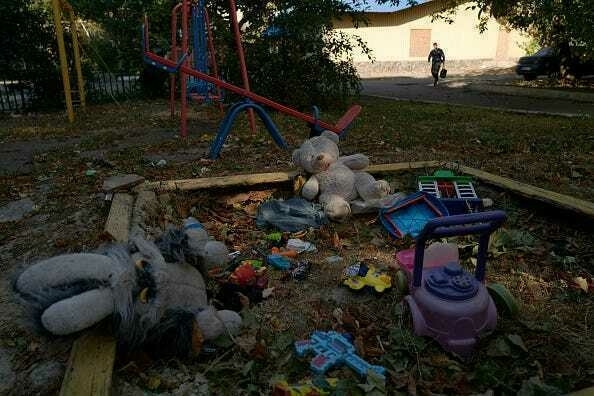
However, the Ukrainian side is more optimistic. Kateryna Rashevska, a board member of Bring Kids Back UA, initially doubted that the data had been permanently deleted.
“To store and accumulate such information, there can be no such action or operation without notifying Ukraine, as the state of citizenship of these children,” Kateryna Rashevska told The Counteroffensive.
Moreover, nearly 20,000 of the children in the Yale database have already been identified by Ukraine in some form. So a majority of the children will be accounted for through some other format.
Like in so many other ways, the latest development is impressing on Ukraine the need to be independent from the United States government.
Now the Ministry of Justice of Ukraine is actively working to create a new register for deported children, according to Rashevska.
NEWS OF THE DAY:
Good morning to readers; Kyiv remains in Ukrainian hands.
NEW ROUND OF UKRAINE-US TALKS: Ukraine and the United States have begun a new round of talks in Riyadh, Saudi Arabia, AFP reports. The day before, talks were held with Russia to discuss the US desire to cease fire in the Black Sea.
The Black Sea Initiative was a key topic of conversation. A similar agreement was concluded in 2022 between Ukraine and Russia with the mediation of the UN and Turkey, but in July 2023, Russia withdrew from this agreement. Since then, Ukraine's port infrastructure has been regularly attacked.
Following Russia's initial agreement to a ceasefire on energy and civilian infrastructure and the collapse of that agreement, there are concerns that Russia is dragging out the negotiations to consolidate its military gains in Ukraine and gain a more favorable position.
GOP SENATORS WANT TO GIVE UKRAINE RUSSIAN FROZEN ASSETS: A group of US senators are proposing using frozen Russian assets to put pressure on Moscow to cease fire, Reuters reports.
They sent the proposal in a letter to Secretary of State Marco Rubio. 4 senators (2 Republicans and 2 Democrats) signed the letter. The Trump administration is being urged to transfer more than $300 billion in frozen assets to help Ukraine.
Republicans and Democrats also propose using the available assets as leverage in the negotiations. This letter is one of the few examples of a GOP call to be tougher with Russia since the second Trump term began.
Some European leaders also want to use the frozen assets to rebuild Ukraine, but face legal challenges in doing so.
DUTCH ENCOURAGES UKRAINIAN DEFENSE INVESTMENT: Denmark will provide compensation to its companies that are willing to invest in the Ukrainian defense industry, Economichna Pravda reports. This was announced by the First Vice Prime Minister of Economy of Ukraine. The total amount in the program is 130 million euros. This instrument actively supports both Danish business and Ukrainian enterprises, the minister said.
DOGS OF WAR:
Today’s Dogs of War are these cuties Nastia spotted at her weekend getaway in Chernivtsi (a city in Western part of Ukraine). They were impatiently waiting for their owners near the railway station, while they moved baggage to the car.
Stay safe out there.
Best,
Nastia


